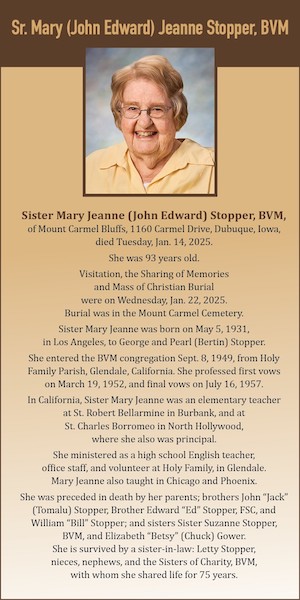This past weekend I was invited to address students in the business program at Mount Saint Mary’s University here in Los Angeles.
I do not hold a master’s degree in business. I have training as an accountant, so I know how companies work. However, my main job is to be a pastor, a priest.
But as I was praying and thinking about it, it struck me that there are management lessons we can learn from Jesus and the Church.
The Church is not a “corporation.” The Church is the family of God on earth, called to carry on the mission that Jesus Christ gave to her. But in earthly terms, we do have a kind of “corporate profile.”
The Archdiocese of Los Angeles employs more than 16,000 people. We oversee payroll and taxes, pensions and health care plans; we manage a large portfolio of investments. We also operate several nonprofit foundations that provide charitable grants.
Of course, our primary “revenue stream” comes from the generosity of our Catholic people. We are a nonprofit and for us that means everything we bring in goes out in the form of services to our people and the wider community.
We have about 500 or 600 “franchise outlets” or “points of presence” in a “service territory” of about 9,000 square miles — that includes our parishes, schools and all our various ministries in Los Angeles, Ventura and Santa Barbara counties.
Our “customer base” numbers about 5 million Catholics and is incredibly diverse — in terms of race, ethnicity and economic status. We carry out our operations in more than 40 different languages.
So what is the Church’s “business”?
People tend to see the Church as a charitable or humanitarian institution. And that is an important part of what we do.
Our parishes and agencies provide services to nearly 1 million people each year, most of them non-Catholic. We serve nearly 80,000 young people in our schools — two-thirds are from minority households and about one-third are from families living below the poverty line.
But our corporate mission is much more than that. I would say we are in the “mercy business.”
The Church holds the most precious “commodity.” Our Founder and owner called it “the pearl of great price” — the path to true happiness and everlasting life that every person longs to find.
That is the Church’s bottom line.
And as I was thinking about it, my management philosophy as an archbishop is based on the words and example of our “corporate Founder,” Jesus Christ. For me, leadership in the Church is about knowing our purpose — “why” we are doing what we do.
We all know what the Church does. We celebrate Mass and we make the sacraments available — baptism, confession, marriage, confirmation. We teach kids and we heal patients. We help the elderly and the poor. We work for justice in society and try to inspire people to do good and to seek God.
But none of that explains “why” we do what we do. And if we do not think about “the why,” the Church is reduced to only another humanitarian agency trying to make the world a better place.
Jesus is “the why” of the Church. He is the Founder and owner of the Church and we do everything because of him and we do it for him.
Apart from whatever technical and professional skills they bring to their jobs, our employees need to love Jesus and want to follow him and serve his mission. This is the key to our “corporate identity.”
We do not just have a job — we have a mission. The “why” makes all the difference.
Feeding the hungry is important. People need to eat. But when we feed the hungry, as followers of Christ, we have his larger mission in mind. Through the love we show to the poor, we hope to bring them to discover the love of God.
Jesus also gave us instructions for “how” we are to lead.
In founding the Church, he told the apostles, “Whoever would be great among you must be your servant.”
He held himself up as the model for leadership. He said he came “not to be served, but to serve.” That should be the leadership motto for everyone in the Church — to serve, not to be served.
We do not lead by “being the boss.” We exercise leadership through humble service to others, always asking, “What does this person need and how can I help?”
Maybe our business schools should be studying the “leadership style” of Jesus. After all, he founded the most successful institution in human history — the Catholic Church.
The saints and religious founders who followed in Jesus’ footsteps are some of the most dynamic “entrepreneurs” the world has ever seen.
Pray for me this week and I will be praying for you. And let us ask our Blessed Mother Mary to intercede and guide us always to follow in the footsteps of her son.

